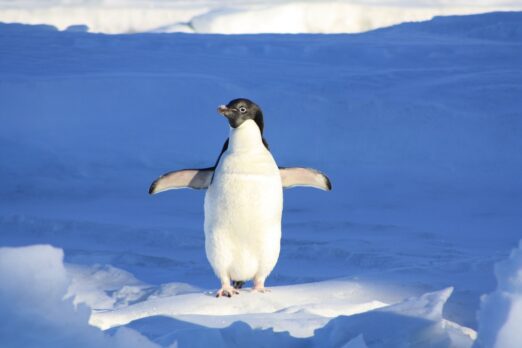
Our planet is in the midst of the sixth mass extinction — with nearly one million plant and animal species facing extinction by 2040 because of human activity. This biodiversity loss is due to factors including climate change, pollution, invasive species, resource exploitation (overfishing/hunting), and the unsustainable use of land and water for food production.
Wildlife populations (mammals, birds, amphibians, reptiles, and fish) have plummeted by an average of 69 percent since 1970, according to the World Wildlife Fund’s Living Planet Report 2022. The reindeer (Union caribou) population has declined 75 percent in the last four years and is now on the U.S. endangered species list, as the melting sea-ice is causing reindeer to fall through the ice during their migration. Emperor penguins are facing the same fate in Antarctica where melting sea ice means they have no place to breed, raise families, or escape predators.
And in a new watershed report from the U.N., the risk of global extinction for the world’s migratory species is also increasing.
When human activity destroys forests, grasslands, glaciers, or coral reefs, we derail entire ecosystems that provide habitats for diverse species and also help regulate the climate by capturing carbon.
Our global economy depends on biodiversity. The World Economic Forum estimates that about half of global economic output depends on ecosystems and wildlife, ranging from insects pollinating crops to wetlands purifying water. Healthy biodiversity impacts our food security, health, and quality of human life.
There are some indications that governments and business are taking this threat more seriously than they have in the past. At the recent U.N. Biodiversity Conference in Montreal, nearly 200 countries set ambitious conservation targets to protect 30 percent of land and 30 percent of oceans by 2030. The agreement also includes a commitment of up to $30 billion in annual aid from rich nations to developing countries by 2030. The framework also specifies that businesses will be required to assess and disclose their risks, impacts and dependencies on nature. For this framework to drive change, there must be tracking and accountability on progress made towards these targets.
While the predictions are dire, there are some reasons for hope. Governments, financial institutions, and businesses are recognizing the importance of biodiversity and nature-based solutions, we have better tools to track progress, Indigenous peoples protect 80 percent of the world’s remaining biodiversity, and when we do the hard work, ecosystems can recover.
Protecting biodiversity will require all of us to change our habits to respect, sustain and restore the ecosystems and biodiversity we depend on for life on Earth.
Learn more about grassroots actions you can take @ World Wildlife Fund

Annual global bottled water consumption is estimated to have reached 118 billion gallons in 2023. That’s equivalent to 1 million…

The world is driving towards a new era of electric transportation. This is good news for fighting the climate crisis,…

The past few summers have been breaking heat records but winters are actually warming faster than summers in most of…